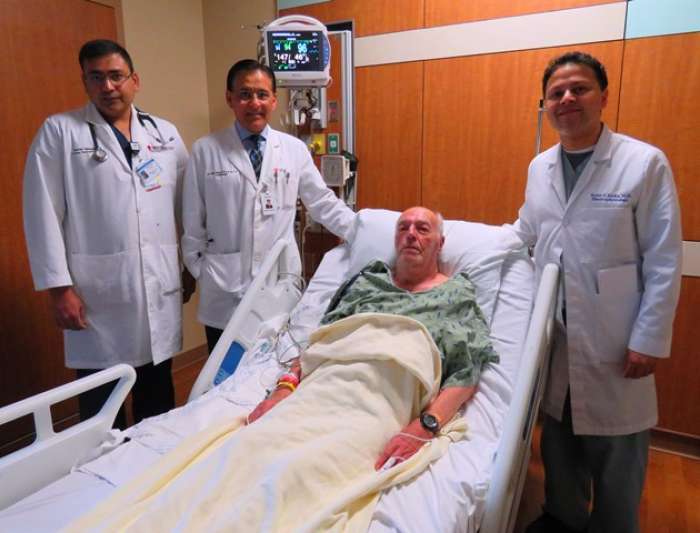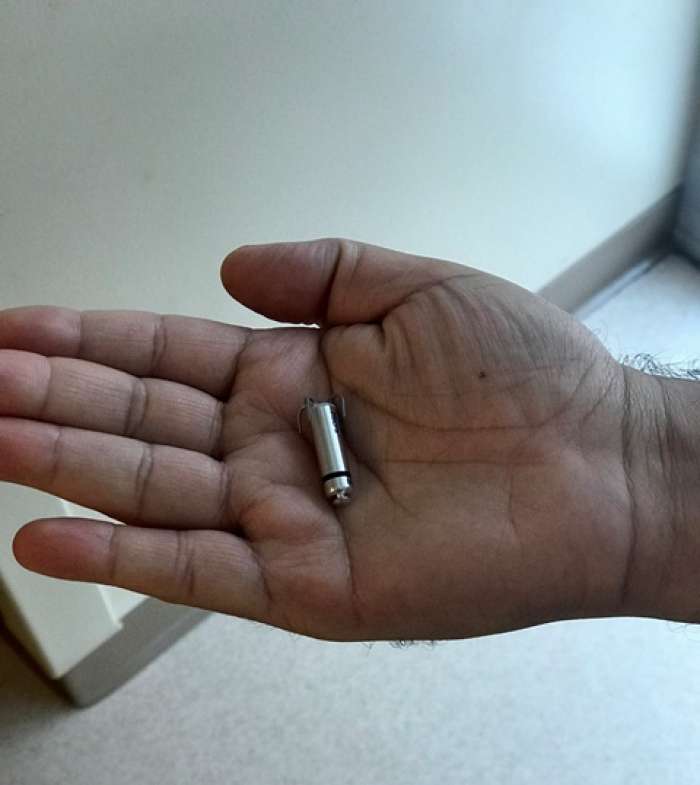St. Luke's Health joins CommonSpirit.org soon! Enjoy a seamless, patient-centered digital experience. Learn more

Pictured from left to right: Electrophysiologist Satish Velagapudi, M.D., Interventional Cardiologist and Medical Director of the CHI St. Luke’s Health-Memorial Cath Lab M. Musa Khan, M.D., Jack Hamilton, and Cardiac Electrophysiologist Rohit Kedia, M.D.

Comparable in size to a large vitamin capsule and one-tenth the size of a traditional pacemaker, the device does not require cardiac wires (leads) or a surgical ‘pocket’ under the skin to deliver the pacing therapy.
A Livingston man suffering from an abnormal heart rhythm is now the area’s first recipient of the world’s smallest pacemaker. The brand new technology was successfully implanted during a procedure at St. Luke’s Health-Memorial Lufkin this week.
Jack Hamilton, 90, arrived at the Livingston Emergency Department last week with an extremely low heart rate. His heart was unable to pump enough oxygen-rich blood to his body, which caused dizziness and near fainting. George Hamilton said his dad needed serious medical attention and was transferred to St. Luke’s Health-Memorial in Lufkin.
“His heart rate was so low, and we were extremely worried. When we brought him into the ER, he was fading fast and now he seems so much better and his color is so much better,” George Hamilton said the day after the procedure. “I’m so glad it all worked out.”
St. Luke’s Health-Memorial is the first hospital in the region to offer the Micra® Transcatheter Pacing System (TPS), a brand new pacemaker for patients with bradycardia, a condition characterized by a slow or irregular heart rhythm. Hamilton was an ideal candidate for the new procedure which was performed by Cardiac Electrophysiologist Rohit Kedia, M.D. on Tuesday, December 19. Dr. Kedia was assisted by Interventional Cardiologist and Medical Director of the St. Luke’s Health-Memorial Cath Lab M. Musa Khan, M.D. and Electrophysiologist Satish Velagapudi, M.D. – all physicians with the Heart Institute of East Texas. Dr. Kedia received extensive training at the Medtronic Physiological Research Lab in St. Paul, Minnesota in order to bring the technology back to East Texas.
“Pacemakers are the most common way to help restore the heart's normal rhythm and relieve symptoms, but inserting a traditional pacemaker involves a scar on the chest and several days of recovery,” Dr. Kedia said. “However, using the world’s smallest pacemaker, Mr. Hamilton was able to go home the day after his procedure.”
“Comparable in size to a large vitamin capsule and one-tenth the size of a traditional pacemaker, the device does not require cardiac wires (leads) or a surgical ‘pocket’ under the skin to deliver the pacing therapy,” Dr. Khan said. “Instead, the device is small enough to be delivered through a catheter and implanted directly into the heart with small tines, providing a safe alternative to conventional pacemakers without the complications associated with leads – all while being cosmetically invisible.”
The Micra TPS is also designed to automatically adjust pacing therapy based on a patient’s activity levels.
“This new pacemaker is an incredible device that gives our patients, like Mr. Hamilton, a better quality of life,” Dr. Kedia said. “We believe in utilizing the latest medical technology available for our patients’ benefit, and we appreciate St. Luke’s Health for being a leader in cardiovascular care and for bringing this technology to deep East Texas.”
The Micra TPS is the first and only transcatheter pacing system to be approved for both 1.5 and 3 Tesla (T) full-body magnetic resonance imaging (MRI) scans and is designed to send data remotely via the Medtronic CareLink® Network for the physician to follow. The Micra TPS was approved by the U.S. Food and Drug Administration in April 2016 and has been granted Medicare reimbursement, allowing broad patient access to the novel pacing technology.
Publish date:
Thursday, December 21, 2017Looking for a doctor? Perform a quick search by name or browse by specialty.